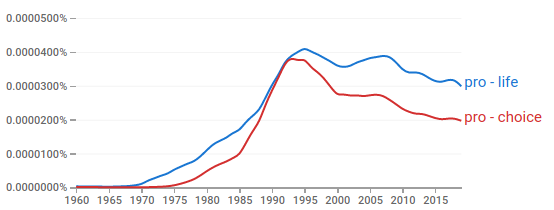On the origins of the terms "pro-life" and "pro-choice"
I recently started a Wikipedia article on the terms “pro-choice” and “pro-life”. I was particularly interested in the origins of the terms. The article gives what I hope is a reasonable overview of what secondary sources have to say about the history of the terms. In this post, I’m going to share a bit of original research on the topic (which Wikipedia – quite rightly – has a policy of not permitting in its articles).
In 1990, William Safire claimed in his “On Language” column in the New York Times that the term “pro-choice” predates “pro-life”. He dates the former to a 1975 Wall Street Journal article by Alan L. Otten, and gives a 1976 NYT article as the first appearance of the latter in print. The claim that these represent the first occurrences of these phrases in print has since been repeated in a number of sources, such as this 2013 Atlantic article.
However, the OED has significantly antedated both of these in its 3rd edition, with a 1969 quotation for “pro-choice” and 1971 for “pro-life” (for reference, the Roe v. Wade decision came out in 1973).
A further antedating of “pro-life”
Fred Shapiro, in a post to the American Dialect Society mailing list, showed off a further antedating of “pro-life” to 1969. Regrettably, this appears to be a case of bad metadata. The newspaper article this is taken from is actually from 1989 (Newspapers.com’s OCR has a habit of confusing 8s with 6s).

But with a bit of digging, I was able to antedate “pro-life” to 1970. Through newspapers.com (which I am grateful to The Wikipedia Library for giving me access to), I was able to find multiple occurences of “pro-life” in 1970. The most unambiguous is a 1970 article “Abortion Issues Stir Stormy Session” in The Ottawa Journal, May 6 1970. The following is in the context of a public meeting on abortion held by the Ottawa Women’s Liberation Movement:
In the audience were some members of an organization called the “Alliance for Life.” Philip Cooper said he preferred to describe the group he belongs to as pro-life rather than anti-abortion. The organization believes human life exists from the moment of conception and that any attempt to destroy that life is a crime.
(Sidenote: as this excellent Quartz article by Annalisa Merelli points out, even before the term “pro-life” was in use, it was common for anti-abortion groups to use “Life” as part of their branding. For example, the Right to Life League (founded 1967), and the Minnesota Citizens Concerned for Life (1968).)
Which came first?
At every stage, the evidence has pointed in the direction of “pro-choice” appearing in print before “pro-life”. So you might be surprised to learn that recent sources, such as the above-mentioned Quartz article, put forth the narrative that ‘the label “pro-choice” was created specifically to counter “pro-life.”’ (For another example, see this 2019 NYT article.)
This idea seems to have been popularized by Linda Greenhouse and Reva Siegel in their 2010 book Before Roe v. Wade, which quotes a 1972 memo written by Jimmye Kimmey, director of an early abortion rights group, the Association for the Study of Abortion, which speaks of “the need to find a phrase to counter the Right to Life slogan”:
Right to Life is short, catchy, and is composed of monosyllabic words (an important consideration in English). We need something comparable – Right to Choose would seem to do the job.
So is this widespread narrative that “pro-choice” was a reaction to “pro-life” a total myth? Maybe not. Rather than asking which made it into print first, it might be more informative to consider which entered popular use first. Google Books Ngrams gives this pretty handily to “pro-life”:

So even though we have sporadic sightings of both terms going back at least as far as 1970, in terms of entry intro widespread use, “pro-choice” lags behind “pro-life” by several years.
“Pro-abortion” was the term of choice before the popularization of “pro-choice”, and remained more frequent in print until 1980 (ngrams link).
The significance of the Jimmye Kimmey memo
Before Roe v. Wade does not make the claim that the 1972 memo quoted above represents any kind of first, but it seems subsequent writers have (incorrectly) used it to conclude that Kimmey coined “Right to Choose” (or even “Pro-choice” - a term which doesn’t appear anywhere in the memo!) in 1972:
- Quartz (2017): “Linda Greenhouse and Reva B. Siegel[…] say the framing around choice was introduced by Jimmye Kimmey, the director of Association for the Study of Abortion (ASA), who in 1972 wrote a memo…”
- University of North Texas Libraries (2019): “Kimmey was the first to discuss the need for abortion rights advocates to have a catchy phrase like the ‘right to life’ movement. She concluded that the phrase ‘right to choose’ was the most concise and catchy way to spread their message, and is therefore said to be responsible for coining the term ‘pro-choice.’”
- n+1 magazine (2017): “The president of the Association for the Study of Abortion, Jimmye Kimmey, is credited for coming up with the phrase “pro-choice” in 1972.”
Given that “pro-choice” can be antedated to at least 1969, I think we can safely say that these claims are flatly incorrect. But though Kimmey didn’t invent “pro-choice” or “Right to Choose” (which, as William Safire points out in a 1979 column, has an antecedent as a slogan used in opposition to the racial integration of schools), her 1972 memo, which circulated inside what was arguably the leading pro-abortion organization in the US at the time, may represent an important step toward the eventual popularisation of these terms.
Tagged: Linguistics